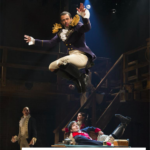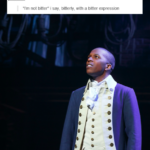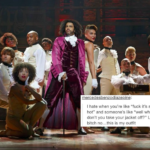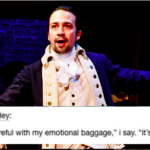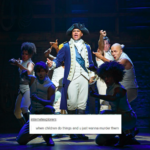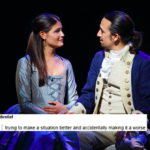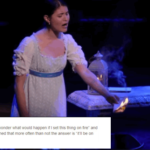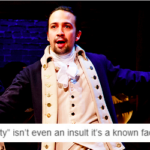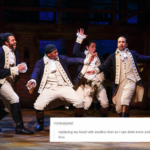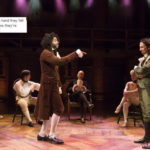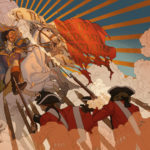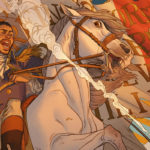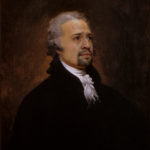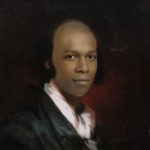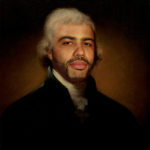Jefferson: so I know your child just got murdered and shit but will you endorse me, your arch enemy, for president
Hamilton: fu k off
Jefferson: Burr is the competition
Hamilton: GIVE ME A FUCKING PEN
How does ‘Hamilton,’ the non stop, hip-hop Broadway sensation tap rap’s master rhymes to blur musical lines? – WSJ.com
Coolio!
There must be something wrong with the universe because none of the Hamilton weirdos on my dash have reblogged this yet.
Holy shit, this is fascinating!
I love Hamilton, but something about the way white fans engage with the musical really bothers me: a lot of them are posting in the tag about the actual, historical revolutionaries and founding fathers in a way that makes them seem like funny, sweet, good people. They weren’t. I don’t just mean “Jefferson was a piece of shit”: none of them were good. Every one of their asses saw black people as inferior, even if not all of them supported slavery. All of them participated in genocidal policy against indigenous peoples. If you’re watching/listening to Hamilton and then going out and romanticizing the real founding fathers/American revolutionaries, you’re missing the entire point.
Hamilton is not really about the founding fathers. It’s not really about the American Revolution. The revolution, and Hamilton’s life are the narrative subject, but its purpose is not to romanticize real American history: rather, it is to reclaim the narrative of America for people of colour.
Don’t romanticize the founding fathers and the revolution. They’re already romanticized. It’s been done. Your history books have already propagated those lies. The revolution is romanticized as an American narrative because it was a revolution lead by and for white men. Their story is the narrative of the nation and it is a narrative from which people of colour are utterly obliterated.
Do you understand what it’s like to live in a nation where you are made marginal and inconsequential in the historical narrative that you are taught from your first day of school? In the Americas, to be a person of colour is to be made utterly inconsequential to the nation’s history. If you are black, your history begins with slavery, and your agency is denied; they don’t teach about slave rebellions or black revolutionaries. You learn about yourself as entirely shaped by outside forces: white people owned you, then some white people decided to free you and wasn’t that nice of them? and then you’re gone until the civil rights movement. That is the narrative they teach; in which you had no consequence, no value, no impact until less than a century ago. If you are indigenous, you are represented as disappeared, dead, already gone: you do not get to exist, you are already swallowed by history. If you are any other race, you are likely not present at all. To live in a land whose history is not your own, to live in a story in which you are not a character, is a soul-destroying experience.
In Hamilton, Eliza talks, in turn, of “taking herself out of the narrative” and “putting herself back in the narrative.” That’s what Hamilton is about: it’s about putting ourselves in the narrative. It puts people of colour in the centre of the damn narrative of the nation that subjugates them; it takes a story that by all accounts has been constructed to valourize the deeds of white men, and redefines it all.
Why was the American Revolution a revolution? Why were slave revolts revolts? Why do we consider the founding fathers revolutionaries and not the Black Panthers or the Brown Berets or any number of other anti-racist revolutionary organizations? Whose rebellion is valued? Who is allowed to be heroic through defiance? By making the founding fathers people of colour, Hamilton puts people of colour into the American narrative, while simultaneously applying that narrative to the present. Right now, across the United States, across the damn world, people are chanting “black lives matter.” Black people are shutting down malls and highways, demanding justice for the lives stolen by police, by white supremacy. And all across the world, indigenous people are saying “Idle No More,” blockading pipelines, demanding their sovereignty. And “No One is Illegal” is chanting loud enough to shake down the walls at the border; people are demanding the end of refugee detention centres, demanding an end to the violence perpetuated by anti-immigration policies. People of colour are rising up.
…And white people are angry about it. White people are saying “if blacks don’t want to get shot by the police they shouldn’t sag their pants”; saying “get over it” about anti-indigenous policies of assimilation and cultural genocide and land theft; Jennicet Gutiérrez was heckled by white gay men for demanding that president Obama end the detention of undocumented trans women of colour. White people see people of colour rising up and they tell us to sit down. Shut up. Stop making things difficult. The American Revolution was a bunch of white men who didn’t want to be taxed, so white history sees their revolutionary efforts as just; they killed for their emancipation from England; they were militant. That, to white people is acceptable. But those same white people talk shit about Malcolm X for being too violent–a man who never started an uprising against the government leading to bloodshed. Violence is only acceptable in the hands of white people; revolution is only okay when the people leading the charge are white.
Hamilton makes those people brown and black; Hamilton depicts the revolution of which America is proud as one led by people of colour against a white ruling body; there’s a reason King George is the only character who is depicted by a white man. The function of the visual in Hamilton is to challenge a present in which people of colour standing up against oppression are seen as violent and dangerous by the same people who proudly declare allegiance to the flag. It forces white people to see themselves not as the American Revolutionaries, but as the British oppressors. History is happening, and they’re on its bad side.
So don’t listen to or watch Hamilton and then come out of that to romanticize the founding fathers. Don’t let that be what you take away from this show. They’re the vehicle for the narrative, and a tool for conveying the ideologies of the show, but they are not the point. Don’t romanticize the past; fight for the future.
Legacy. What is a legacy?
*swoon* Made my morning.
Oh my god, my face hurts from smiling. THE ENDING.

